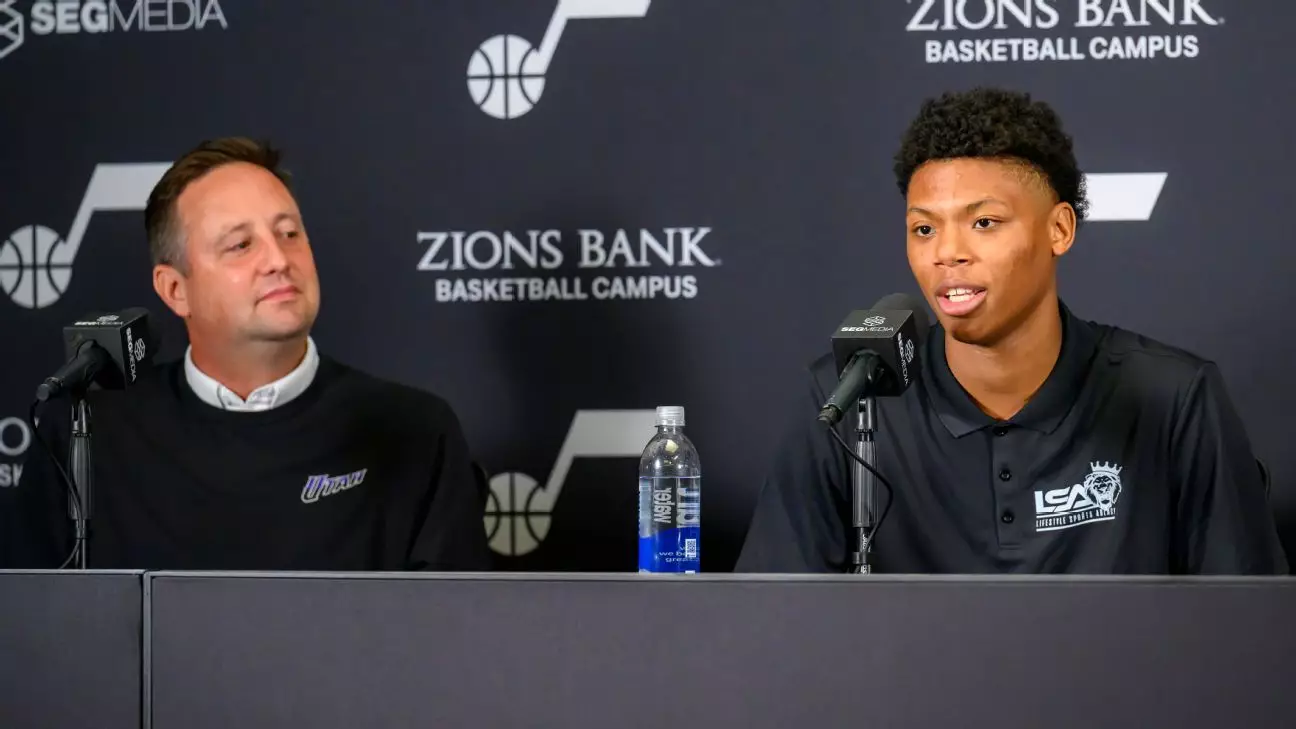Ace Bailey’s path to the NBA has been anything but straightforward. Drafted fifth overall by the Utah Jazz, Bailey entered the league under a cloud of skepticism sparked by his pre-draft decisions. Foregoing workouts with some interested teams, including the Philadelphia 76ers and Charlotte Hornets, raised eyebrows about his willingness to engage fully in the traditional evaluation process. Such actions often suggest a player might leverage their draft stock to land somewhere more desirable. Yet, Bailey’s demeanor at his introductory press conference was refreshingly grounded. Rather than expressing regret or reluctance, he embraced his new chapter with palpable enthusiasm, emphasizing gratitude over grievance.
This attitude reveals a critical aspect often overlooked in rookie narratives—the capacity for self-awareness and adaptation. Bailey could have clung to a sense of entitlement; instead, he leaned into his situation with humility and optimism. That he came to Utah without a publicized “holdout” or immediate demand for a trade speaks to a maturity beyond his 18 years. It challenges the cynicism that talent alone dictates success in professional sports, underscoring the importance of character in a player’s development trajectory.
Jazz’s Calculated Gamble on Untamed Talent
Utah’s decision to pick Bailey despite his apparent lack of enthusiasm for the team is a bold one. The Jazz are implicitly betting that his potential outweighs the uncertainties. The front office, led by Austin Ainge, openly celebrates the trio of rookies joining their squad—Bailey alongside Walter Clayton Jr. and John Tonje—as embodiments of high potential combined with strong character. This tandem approach reflects an organizational philosophy that champions multidimensionality: scoring prowess paired with defensive versatility.
Yet, the Jazz face inherent risks. Bailey’s fall from the projected top three to the fifth pick signals underlying concerns—his game, while versatile, is not without flaws. His shooting efficiency and defensive intensity have raised questions, as has his overall maturity. However, Utah’s gamble is not on a polished product but on the promise of growth and refinement. By providing an environment conducive to development, the Jazz are placing faith in Bailey’s untapped capacity to evolve.
Raw Versatility Meets Developmental Challenges
Bailey’s collegiate performance at Rutgers showcased a blend of skills that are tantalizing for a modern NBA forward. Standing 6-foot-8, he demonstrated an ability to score from various spots on the floor, from step-back threes to aggressive drives. Averaging 17.6 points and 7.2 rebounds reflects a well-rounded game and a willingness to contribute in multiple ways. His self-description as a player who brings energy across rebounding, defense, scoring, and passing suggests an awareness of the expansive skill set needed at the next level.
However, optimism about his offensive versatility must be balanced against the concerns that pushed him down draft boards. Scoring efficiency and ballhandling are crucial in the NBA, where defenses are tighter and mistakes are punished severely. Bailey’s defensive commitment and maturity, both mental and emotional, remain under scrutiny. This tension encapsulates the dilemma faced by many young players: raw talent is a foundation, but without the discipline and cognitive growth to harness it, potential can stagnate.
Trusting the Process Amidst Imperfections
Bailey’s candid acknowledgment that no one is perfect and that mistakes are integral to growth signals psychological resilience. He places faith in his preparation and work ethic, which, for a young athlete, is a promising indicator. His attitude challenges the simplistic narrative of flawless prodigies and instead embraces the messy reality of progression. This authenticity offers a refreshing contrast to the sometimes manufactured personas crafted around top prospects.
In a broader sense, Bailey’s trajectory invites a reflection on how professional sports handle talent cultivation. The urgency to deliver immediate results often overshadows patience, yet players like Bailey demonstrate that the journey is gradual and fraught with setbacks. The Jazz’s investment in multiple rookies with high ceilings reveals a commendable commitment to nurturing talent rather than demanding instant stardom.
Ultimately, Bailey’s story, with its blend of controversy, potential, and self-awareness, epitomizes the complex human dimension in sports. It challenges fans and analysts alike to recalibrate expectations and celebrate growth over perfection. His time in Utah will test not just his abilities on the court but his capacity to embody the resilience and adaptability essential for lasting success.

